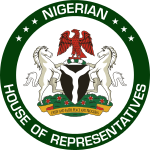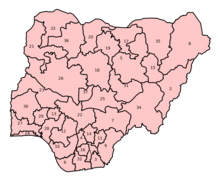House of Representatives (Nigeria)
House of Representatives | |
|---|---|
| 9th National Assembly | |
 | |
| Type | |
| Type | Lower Chambers of the National Assembly of Nigeria |
| Leadership | |
Deputy Speaker of the House of Representatives | |
| Structure | |
| Seats | 360 |
 | |
Political groups | Majority (233)
Minority (118) Others (5) Vacant (4)
|
Length of term | 4 years |
| Elections | |
| First-past-the-post | |
Last election | February 2019 |
Next election | February 2023 |
| Meeting place | |
 | |
| Abuja | |
| Website | |
| http://www.nass.gov.ng | |
Politics of Nigeria |
|---|
 |
|
The House of Representatives is the lower chamber of Nigeria's bicameral National Assembly.[1] The Senate is the upper chamber.[2]
The House of Representatives has 360 members who are elected in single-member constituencies using the plurality (or first-past-the-post) system. Members serve four-year terms. The Speaker of the Nigerian House of Representatives is the presiding officer of the house.
Nigerian state delegations[]
The Constitution of the Federal Republic of Nigeria, assumes a National Assembly for the federation which consist of a senate and a House of Representatives. The senate consist of three senate members from each Nigerian state and one senate member from the Federal Capital Territory, Abuja. There must be three hundred and sixty members in total, representing constituencies for the Federal House of Representatives.[3]
|

|
Members (since 1979)[]
- Members
- Clerks
Party leaders[]
Party leaders and whips are elected by their respective parties in a closed-door caucus by secret ballot. With the APC holding a majority of seats and the PDP holding a minority, the current leaders in the 8th National Assembly are: Majority Leader Femi Gbajabiamila, Chief Whip Ado Garba Alhassan, Minority Leader Ogor Okuweh, and Minority Whip Umar Barde Yakubu.[4]
See also[]
- History of Nigeria
- Legislative branch
- List of national legislatures
- Nigerian First Republic
- Nigerian Second Republic
- Nigerian Third Republic
- Nigerian Fourth Republic
References[]
- ^ Abdur-Rahman, Alfa-Shaban (12 June 2019). "Nigeria National Assembly leadership". africanews.com. Retrieved 13 June 2021.
- ^ "National Parliaments: Nigeria". loc.gov. Retrieved 13 June 2021.
- ^ "Chapter Five of the 1999 Constitution of Nigeria: Legislature". www.waado.org.
- ^ "Principal Officers of The House of Representatives". Archived from the original on 21 April 2018. Retrieved 20 April 2018.
- House of Representatives (Nigeria)
- National lower houses
- National Assembly (Nigeria)
